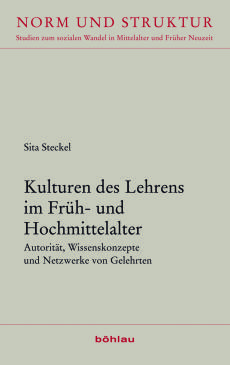Cultures of Teaching in the Early and High Middle Ages
Historian Sita Steckel on Authority and Scholars’ Networks

In her book, Prof. Sita Steckel from the Cluster of Excellence ‘Religion and Culture’ examines the cultures of teaching in the Early and High Middle Ages. “The scholarly culture of the Latin West before the rise of the universities in the 12th century appears different when you look at it as more than just the pre-history of later scholarly cultures,” Prof. Steckel explained. In her study, she shows how the teachers of the Early and High Middle Ages did not just communicate knowledge, but also religious “learning”. She thereby locates scholars not in schools, but in ecclesiastical networks. The book has been published under the title, ‘Cultures of Learning in the Early and High Middle Ages. Authority, Concepts of Knowledge and Scholars’ Networks’, in Böhlau Press, Cologne.
Prof. Steckel traces the strategies with which teachers between 800 and 1150 claimed sacralised authority. She thereby compares the ecclesiastically centred knowledge communication of the early medieval Carolingian Empire with the French and German schools of the High Middle Ages. In particular, she looks for new approaches towards the differentiation of knowledge cultures around the year 1000.
Literature: Steckel, Sita, Kulturen des Lehrens im Früh- und Hochmittelalter. Autorität, Wissenskonzepte und Netzwerke von Gelehrten (Norm und Struktur. Studien zum sozialen Wandel in Mittelalter und Früher Neuzeit, vol. 39), Cologne et al.: Böhlau 2011.

